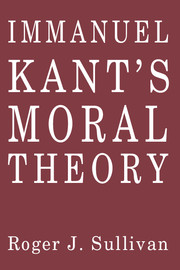Book contents
- Frontmatter
- Contents
- Preface
- Key to abbreviations and translators
- 1 Introduction
- 2 The context for Kant's moral philosophy
- Part I The nature of morality
- Part II The moral norm for persons
- Part III The norm for moral judgment
- Part IV Kant on history, politics, and religion
- Appendixes
- Notes
- Bibliography
- Index of names
- Index of subjects
2 - The context for Kant's moral philosophy
Published online by Cambridge University Press: 05 June 2012
- Frontmatter
- Contents
- Preface
- Key to abbreviations and translators
- 1 Introduction
- 2 The context for Kant's moral philosophy
- Part I The nature of morality
- Part II The moral norm for persons
- Part III The norm for moral judgment
- Part IV Kant on history, politics, and religion
- Appendixes
- Notes
- Bibliography
- Index of names
- Index of subjects
Summary
Throughout most of the Groundwork, Kant's analysis consists of a hypothetical argument: If there is such a thing as morality, then this is what it is and what it must be. For ordinary people, who do not question the validity of moral demands, that is enough. The moral skeptic, however, requires more: evidence that the demands of morality are not illusory but should be heeded.
The main problem confronting Kant arose out of the New Science developed by Galileo, Kepler, Newton, Descartes, and others. They viewed the universe as an enormous machine governed inexorably by precise physical laws that can be discovered by observation and experiment and that ultimately are mathematical in nature. Freedom and responsibility disappear from this picture of the world – and with them morality. Such a world has no meaning, no purpose, no intrinsic value; it simply is. If we are to have a science of human behavior, we need to give up the belief that at least part of us – our invisible “souls” – is exempt from such laws. Human beings must be regarded as nothing more than things like all other things, insofar as we are completely determined by causal laws of nature.
Kant had no desire to oppose the New Science, but to defend belief in morality (and religion), he would have to show that theoretical or scientific knowledge has limitations that prevent it from reaching all of reality.
- Type
- Chapter
- Information
- Immanuel Kant's Moral Theory , pp. 11 - 20Publisher: Cambridge University PressPrint publication year: 1989



